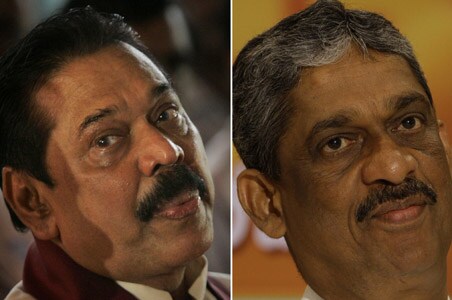
AP Image
Colombo:
Mahinda Rajapaksa on Wednesday emerged victorious in the first post-LTTE era Presidential elections against former army chief Sarath Fonseka after counting showed that he had secured nearly 60 per cent of the total votes polled, according to his office.
Profiles of the two main candidates in Sri Lanka's presidential election:
Mahinda Rajapaksa: Incumbent President Rajapaksa, 64, is a scion of a renowned political family. He has become a hero to the Sinhalese majority for leading the offensive that destroyed the Tamil Tigers last year after more than two decades of brutal civil war that killed 80,000-100,000 people.
Hoping to cash in on his postwar popularity, Rajapaksa called the election in November, two years before his current mandate ends.
When he was first elected in 2005, a Tamil boycott of the vote called by the rebels was considered responsible for his narrow victory. Now, the main Tamil political party is supporting his main challenger, the former army chief Sarath Fonseka.
Considered a man of the masses, Rajapaksa draws most of his support from the rural Buddhist Sinhalese, who see him as a protector of their economic and political rights.
His critics accuse him of war crimes in his pursuit of victory over the rebels, and corruption and nepotism for appointing his brothers and several relatives to top government positions.
Rajapaksa says that with the war over, he would dedicate his next term to economic development and enforcing the rule of law.
Sarath Fonseka: The 59-year-old former army commander -- who spent most of his military career in the fight against the Tamil rebels -- is trying to capitalize on his status as a hero among the Sinhalese, for leading the military to last year's victory.
Born in the southern fishing town of Ambalangoda, Fonseka joined the army in 1970, was twice wounded in battle and narrowly survived a rebel suicide assassination attempt in 2006.
After months of recovering from the wounds, Fonseka led the final offensive against the rebels.
A controversial figure, Fonseka reportedly said he was fighting for a Sinhalese-Buddhist nation, causing a stir among the mainly Hindu Tamils and the Muslim community.
As a politician, Fonseka has promised equality to all ethnic groups and has managed to win the support of a key Tamil political party that considers the former general the lesser of two evils.
Troops under Fonseka's command are accused of committing war crimes stemming from the heavy civilian casualty toll in the final battles against the rebels. He has also been accused of targeting dissident journalists, many of whom were abducted by unknown men and beaten up and dumped along roads after criticizing him. Fonseka has denied these accusations.
Fonseka says that if elected, he will reduce the power of the presidency and empower the parliament.
Profiles of the two main candidates in Sri Lanka's presidential election:
Mahinda Rajapaksa: Incumbent President Rajapaksa, 64, is a scion of a renowned political family. He has become a hero to the Sinhalese majority for leading the offensive that destroyed the Tamil Tigers last year after more than two decades of brutal civil war that killed 80,000-100,000 people.
Hoping to cash in on his postwar popularity, Rajapaksa called the election in November, two years before his current mandate ends.
When he was first elected in 2005, a Tamil boycott of the vote called by the rebels was considered responsible for his narrow victory. Now, the main Tamil political party is supporting his main challenger, the former army chief Sarath Fonseka.
Considered a man of the masses, Rajapaksa draws most of his support from the rural Buddhist Sinhalese, who see him as a protector of their economic and political rights.
His critics accuse him of war crimes in his pursuit of victory over the rebels, and corruption and nepotism for appointing his brothers and several relatives to top government positions.
Rajapaksa says that with the war over, he would dedicate his next term to economic development and enforcing the rule of law.
Sarath Fonseka: The 59-year-old former army commander -- who spent most of his military career in the fight against the Tamil rebels -- is trying to capitalize on his status as a hero among the Sinhalese, for leading the military to last year's victory.
Born in the southern fishing town of Ambalangoda, Fonseka joined the army in 1970, was twice wounded in battle and narrowly survived a rebel suicide assassination attempt in 2006.
After months of recovering from the wounds, Fonseka led the final offensive against the rebels.
A controversial figure, Fonseka reportedly said he was fighting for a Sinhalese-Buddhist nation, causing a stir among the mainly Hindu Tamils and the Muslim community.
As a politician, Fonseka has promised equality to all ethnic groups and has managed to win the support of a key Tamil political party that considers the former general the lesser of two evils.
Troops under Fonseka's command are accused of committing war crimes stemming from the heavy civilian casualty toll in the final battles against the rebels. He has also been accused of targeting dissident journalists, many of whom were abducted by unknown men and beaten up and dumped along roads after criticizing him. Fonseka has denied these accusations.
Fonseka says that if elected, he will reduce the power of the presidency and empower the parliament.
Track Latest News Live on NDTV.com and get news updates from India and around the world

